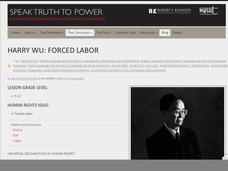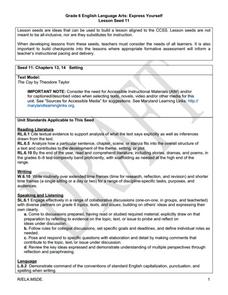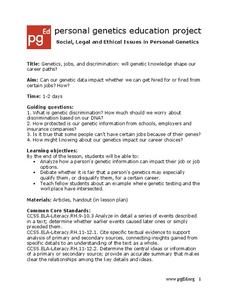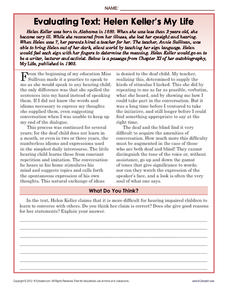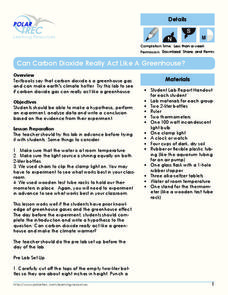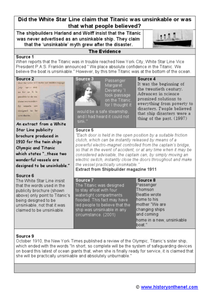Curated OER
Oral History
Use oral history as a way to help learners develop communication skills. They interview a trusted adult about their life as a young person, challenges they overcame, and what they are proud of. Learners are then interviewed themselves in...
Torrey Maldonado
Anti-Bullying & Conflict-Resolution Lesson
Invite your class to consider how to respond to a conflict. Designed to be used alongside Secret Saturdays by Torrey Maldonado, a lesson plan focuses on a set of terms: conflict, escalate, deescalate, conflict resolution, denial,...
EngageNY
Close Reading of The Boy Who Loved Words: How Do People Build Their Word Power?
Third graders practice the skills of identifying the main message in a story, describing the main character, and sorting the key details of a story into specific categories. The story they read is, The Boy Who Loved Words. Using a...
EngageNY
Research: Identifying Categories for Our Research About the Wheelwright
Here is a fine lesson on reading and understanding expository text designed for 4th graders. With a partner, learners read a passage of text about a machine called a wheelright. This machine was commonly used in the colonial...
Hawaiʻi State Department of Education
Finding the Main Idea
You can mix almost any subject with an arts curriculum. Find out how to use drama to find the main idea of a literary text. You'll read a story, and then learners will make tableaus showing what happened, or what they think will happen...
Speak Truth to Power
Harry Wu: Forced Labor
Over the course of two class periods, young historians explore human rights issues; specifically, forced labor in China. This resource provides everything you need, including relevant vocabulary, an anticipatory activity, and a...
Curated OER
Express Yourself Lesson Seed 11: Setting
Encourage your learners to examine the setting in Theodore Taylor's The Cay. Pupils work in small groups to put together a description of the setting before reading two more chapters of the book. They use their double-entry journals to...
Personal Genetics Education Project
Genetics, Jobs and Your Rights
Your class will read an overview of the Genetic Information Nondiscrimination Act, passed in 2008 and address the question of whether or not genetic information should be used to influence our career paths. In jigsaw style, they then are...
Polk Bros Foundation
I Can Infer Predictions Based on an Analysis of Motive
Use a character or person's motivation as the basis for a prediction of that character or person's next action. Pupils select an individual from their reading, copy a quote, write down an inference about that character's motives, and...
Sea World
Marine Animal Husbandry and Training
Step into the role of a zoo director with several activities about animal training and running a zoo. Kids calculate the amount of food each animal needs, design a habitat for penguins, decide how to breed bottlenose dolphins, and train...
K12 Reader
Evaluating Text: Helen Keller's "My Life"
Readers are asked to evaluate Helen Keller's claim, and the evidence she uses to support her argument, that it is more difficult for hearing impaired children to learn to talk with others.
EngageNY
Grade 9 ELA Module 1: Unit 3, Lesson 8
As a mid-unit assessment, class members craft an in-class essay response to the prompt: "How does Shakespeare’s development of the characters of Romeo and Juliet refine a central idea in the play?"
Polar Trec
Can Carbon Dioxide Act Like a Greenhouse Gas?
Ninety-seven percent of scientists who study climate agree that human activity is warming the planet. Learners explore carbon dioxide as a greenhouse gas, a gas causing this warming, through a hands-on experiment. Once complete, they...
Prestwick House
Teaching Shakespeare: Sonnet 73
It's that time of year to consider how Shakespeare selects his images and structures his Sonnet 73 to develop the meaning of the poem. Class members examine the rhyme scheme, the indented lines, the conceit, and the images used in each...
Reed Novel Studies
The Fourteenth Goldfish: Novel Study
Change is not always easy. That becomes evident in the story Fourteenth Goldfish. Ellie, the main character, does not like change and struggles with new things in her life. Scholars learn how Ellie deals with change as they...
Cold Spring Harbor Laboratory
Living Things Share Common Genes
Everything evolved from a common ancestor, but how did modern plants and animals develop so many more genes? Scholars use an online interactive to learn about the process. They begin to understand common genes with an animation, multiple...
College Board
2011 AP® English Literature and Composition Free-Response Questions
A packet of materials from the 2011 AP® exam provides scholars with an opportunity to examine scored sample essays for the three free-response questions. Included are the prompts, the rubric, scoring guides and sample papers.
Space Awareness
Fizzy Balloons - C02 in School
Carbon dioxide is a very important gas; it is present in the air, used in cooking, and supports plant and animal life. Scholars investigate the properties of carbon dioxide with three different activities. They experience a color change,...
Florida Department of Health
Safe and Happy: Safety for All at School and Online Unit
Bystander or upstander and advocate? Three lessons have high schoolers investigating data about bullying and school safety. Participants then learn how to take a stand against bullying and use what they have learned to create a PSA to...
Curated OER
9/11: The Flight That Fought Back
Who is the al Qaeda and what happened on September 11? Older high schoolers will explore the political objectives of al Qaeda and possible reasons for the September 11 terrorist attacks by watching a video program and working through...
Curated OER
White Star Line and the Titanic
Was the Titanic advertised as an unsinkable ship, or was it just what the public believed? In this analysis activity, historians examine both primary and secondary sources to determine the answer to this question and the reliability of...
Curated OER
Unlocking the Secrets of a Persuasive Essay
Full of tips about structure, audience, and evidence in a persuasive essay, this presentation would be a great way to start a writing unit in your class. One slide advises young writers to make up quotes and statistics in their essays....
Curated OER
Marital Roles
Learners consider the differences between egalitarian and traditional marriages. They analyze a series of video clips and mid-century advertisements looking for evidence of gender bias in marriage. Feminism, gender roles for women and...
Curated OER
Anti-Semitism Workshop
Originating from the Yad Vashem Holocaust Memorial Museum in Jerusalem, here is a resource to support your world historians in their study of World War II, the Holocaust, your cultural scholars learning about anti-semitism, or your...







